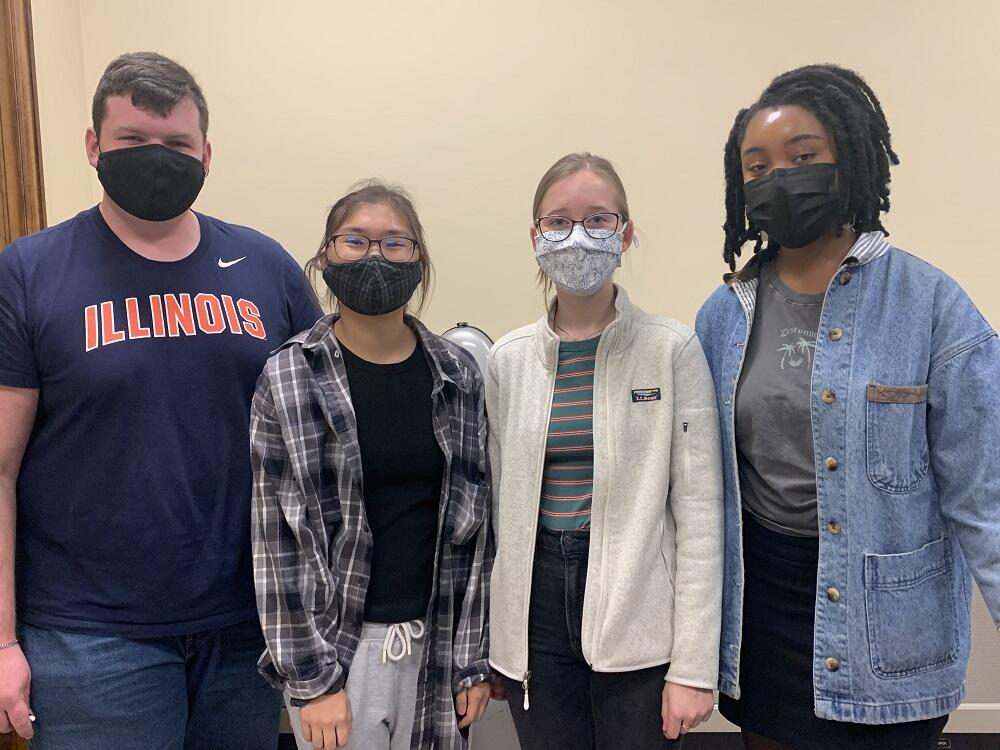Student groups, supporters rally around real food waste action

URBANA, Ill. – Have you ever been in the room when great ideas gel and then turn into action? It’s exciting and rewarding. And it makes people hopeful. Especially when impassioned students take the lead.
That’s happening with vigor as two groups combine forces to tackle a very real issue on the University of Illinois campus and around the world: food waste.
The Metropolitan Food & Environmental Systems Student Association (MFSTSA) and Project 4 Less partnered to make the Urbana-Champaign campus an official chapter of Food Recovery Network. Project 4 Less has been collecting unused food from Lincoln Avenue Dining Hall (LAR) that otherwise would go to waste and sharing it with individuals and families experiencing food insecurity through Wesley Food Pantry, UniPlace, and The Salvation Army.
Project 4 Less collects, packages, and helps transport more than 200 pounds of food most weeks, which translates to 45 boxes of about three meals each reaching those who need them most. To learn more and get involved, visit the campus Food Recovery Network website.
“COVID-19 impacted our work, but we still want to expand what we’re able to do,” says Jenna Schaefer, an Agricultural, Consumer and Environmental Sciences (ACES) student majoring in Agricultural and Consumer Economics. “We’d like to connect with local restaurants to collect and distribute the food they don’t serve and may end up throwing away.”
In addition to food waste recovery work, MFSTSA focuses on providing education “to foster a campus community that values inclusive, equitable, and sustainable food systems,” according to the website. Follow and interact with MFSTSA on Twitter and Instagram.
The hard-working students captured the attention of the university’s Student Sustainability Committee (SSC) as well as the Chancellor’s Office. SSC, a student group dedicated to building a more sustainable campus, has allocated $15.5 million to help fund 316 campus projects since 2008.
Samuel Yoo, assistant director for student sustainability, says, “We have funding available for initiatives like this. SSC can help support wages for programs that increase the sustainability of our campus. We like being able to pay students to do great work while getting engaged with the university’s sustainability efforts.”
Students on the mission to reduce food waste see potential working with more social service agencies, local schools, and more.
Beyond COVID-19, the biggest challenge the food recovery advocates face is working through the rules and regulations that eventually lead to successful setups.
“That’s one place where we can offer help,” says Kim Kidwell, associate chancellor of strategic partnerships and initiatives. “There’s a huge opportunity to make a difference in Champaign County. Helping students make the right connections outside campus just makes sense and stands to benefit so many.”
MFSTSA member and Urban Studies and Planning student Ellie Sander finds the work to mitigate food waste not only meaningful but essential.
“Understanding the science behind systems-based thinking positions us to be change makers,” she says.
MFST is a new major in the College of ACES where students learn about every aspect of building stronger and more sustainable food systems on both local and global levels. Learn more and apply by Jan. 5 to start classes in the fall.
“Students in ACES and all over campus are doing amazing work to create positive change,” says Megan Dailey, MFST director. “This group is destined to welcome more people into the mix. Food recovery is an approachable portion of larger food systems challenges that many people can get behind.”